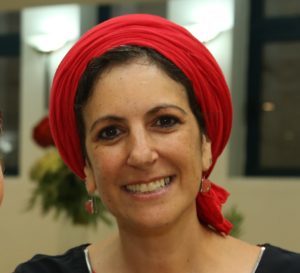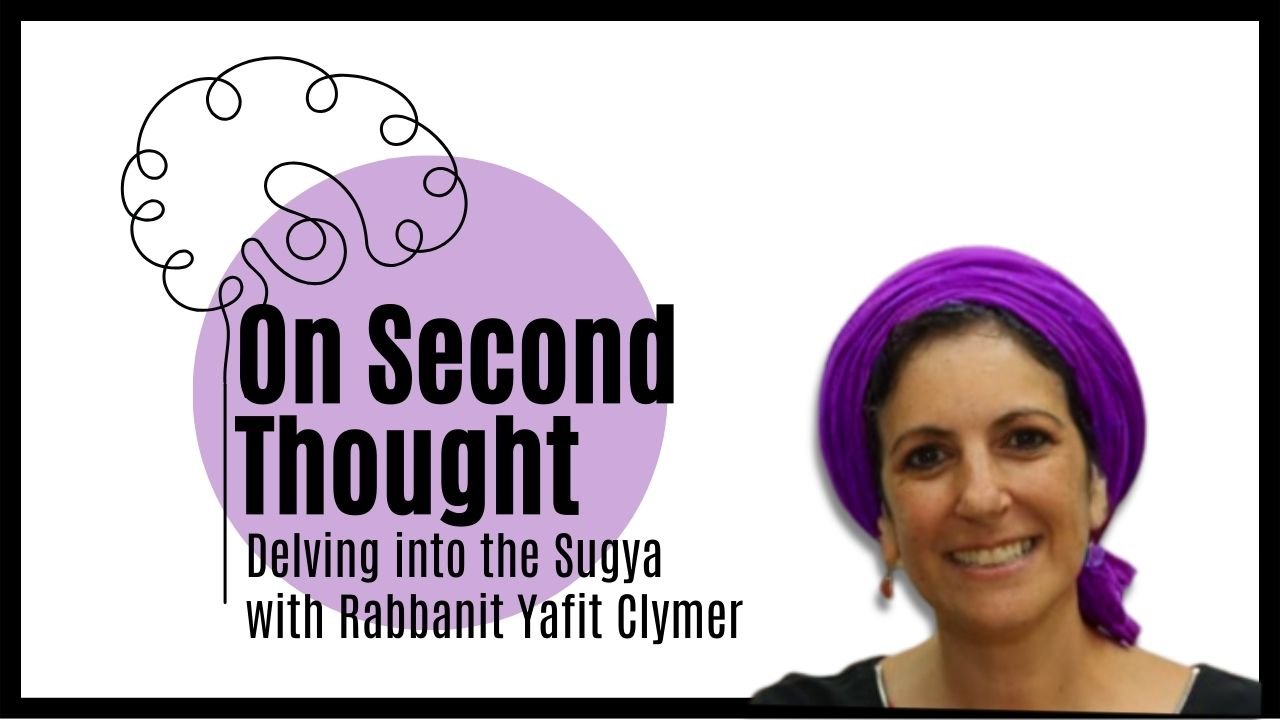On Second Thought: Delving Into the Sugya with Rabbanit Yafit Clymer
Bava Batra 88
Listen here:
Watch here:
Sources:
בבא בתרא דף פח
The Gemara asks: Is that to say that because one determined to buy the produce, even though he says nothing and performs no act of acquisition, he acquires the produce and becomes obligated in tithes? Rav Hoshaya said: Here, we are dealing with a buyer who is God-fearing, such as Rav Safra, who himself fulfilled the verse: “And speaks truth in his heart” (Psalms 15:2).
בבא מציעא מ״ט א
- The Gemara relates: Buyers gave money to Rav Kahana to purchase linen. Ultimately, the price of linen increased. Rav Kahana came before Rav to ask his opinion. Rav said to him: Give them a quantity of linen equivalent in value to the money that you received, and concerning the rest, your verbal commitment is merely a statement, and reneging on a verbal commitment that was unaccompanied by an act of acquisition does not constitute an act of bad faith.
The Gemara comments: This is as it was stated: There is an amoraic dispute with regard to reneging on a verbal commitment that was unaccompanied by an act of acquisition. Rav says: It does not constitute an act of bad faith. And Rabbi Yoḥanan says: It constitutes an act of bad faith.
רמב”ם הלכות מעשרות ה
If [a potential purchaser] was selecting and setting aside, selecting and setting aside, even if he did so the entire day and even if he made up his mind to purchase the produce, he is not obligated to tithe it. If he is a God-fearing person, from the time he made up his mind, he should tithe it. Afterwards, if he desires to return it to the seller, he may return it.
תהילים ט״ו:ב׳
הוֹלֵ֣ךְ תָּ֭מִים וּפֹעֵ֥ל צֶ֑דֶק וְדֹבֵ֥ר אֱ֝מֶ֗ת בִּלְבָבֽוֹ׃
He who lives without blame, who does what is right, and in his heart acknowledges the truth;
ראב”ע – ופועל צדק – עם חביריו
המלבי”ם
דובר אמת בלבבו שלא תהיה אמונתו מן השפה ולחוץ, כי גדר האמונה הסכמת הלב עם מה שהוא מוציא בשפתיו:
He speaks the truth in his heart that his faith should not be from the tongue and to the outside, because the fence of faith is the agreement of the heart with what he puts out with his lips:
מדרש תהילים ט״ו:ג׳
He who walks uprightly and works righteousness. He who walks uprightly is the Holy One, Blessed be He, as it is said, “The Rock, His work is perfect” (Deuteronomy 32:4). And he who works righteousness is the Holy One, Blessed be He, as it is said, “For the Lord is righteous; He loves righteous deeds” (Psalms 11:7). And he who speaks truth is the Holy One, Blessed be He, as it is said, “But the Lord is the true God” (Jeremiah 10:10).
מדרש תהילים ט״ו:ד׳
Another thing is to be innocent This refers to Abraham, as it is said (Genesis 17:1), “Walk before Me and be innocent.” And to do righteousness This is Isaac, whose actions were righteous and who gave his life for God. And to speak truth This is Jacob, as it is said (Micah 7:20), “You will give truth to Jacob, you will not lie to him.”
מכות כ”ד
״הוֹלֵךְ תָּמִים״ – זֶה אַבְרָהָם, דִּכְתִיב ״הִתְהַלֵּךְ לְפָנַי וֶהְיֵה תָמִים״. ״פּוֹעֵל צֶדֶק״ – כְּגוֹן אַבָּא חִלְקִיָּהוּ. ״וְדוֹבֵר אֱמֶת בִּלְבָבוֹ״ – כְּגוֹן רַב סָפְרָא.
״הוֹלֵךְ תָּמִים״ – זֶה אַבְרָהָם, דִּכְתִיב ״הִתְהַלֵּךְ לְפָנַי וֶהְיֵה תָמִים״.
The Gemara analyzes these verses: “He who walks wholeheartedly”; this is referring to one who conducts himself like our forefather Abraham, as it is written concerning him: “Walk before Me and be wholehearted” (Genesis 17:1).
״פּוֹעֵל צֶדֶק״ – כְּגוֹן אַבָּא חִלְקִיָּהוּ.
“Works righteousness”; this is referring to one such as Abba Ḥilkiyyahu, a laborer who would not pause from his labor even to greet people; he righteously continued working.
״וְדוֹבֵר אֱמֶת בִּלְבָבוֹ״ – כְּגוֹן רַב סָפְרָא. “And speaks truth in his heart”; this is referring to one such as Rav Safra
חובות הלבבות, הקדמת המחבר (רבנו בחיי אבן פקודה, ספרד המאה ה11)
You should realize that the aim and value of the duties of the heart is that our exterior and interior be equal and consistent in the service of G-d, so that the testimony of the heart, tongue, and limbs be alike, and that they support and confirm each other instead of differing and contradicting each other.
יסוד מורא וסוד תורה ז׳:ב׳ (רבי אברהם אבן עזרא, מאה 12)
Now, behold, all the mitzvot can be categorized into three ways: firstly, through belief in the heart; secondly, through speech; and thirdly, through action. Each mitzvah is fundamentally based on one of these aspects. If a mitzvah is dependent on speech or action, it still requires belief in the heart. Without it, everything is in vain and futile.
מסילת ישרים יא (רבי משה חיים לוצאטו, איטליה מאה 18)
וְאָמַר (זכריה ח): וְנִקְרְאָה יְרוּשָׁלִַם עִיר הָאֱמֶת, לְהַגְדִּיל חֲשִׁיבוּתָהּ. וּכְבָר אָמְרוּ זִכְרוֹנָם לִבְרָכָה (מכות כד): וְדוֹבֵר אֱמֶת בִּלְבָבוֹ, כְּגוֹן רַב סָפְרָא וְכוּ’, לְהוֹדִיעֲךָ עַד הֵיכָן חוֹבַת הָאֱמֶת מַגַּעַת.
And “[I have returned to Zion, and will dwell in the midst of Jerusalem:] and Jerusalem shall be called the City of Truth” (Zecharia 8:3) – to magnify its importance. And our sages of blessed memory said (Makot 24a): “‘who speaks truth in his heart’ (Tehilim 15:2), like Rav Safra…” To teach you just how far-reaching the obligation of truth extends.
וּכְבָר אָסְרוּ לְתַלְמִיד חָכָם לְשַׁנּוֹת בְּדִבּוּרוֹ חוּץ מִשְּׁלֹשָׁה דְּבָרִים.
The sages forbade a Torah scholar to alter his word except for three things.
וְאֶחָד מִן הָעַמּוּדִים שֶׁהָעוֹלָם עוֹמֵד עָלָיו הוּא הָאֱמֶת, אִם כֵּן מִי שֶׁדּוֹבֵר שֶׁקֶר כְּאִלּוּ נוֹטֵל יְסוֹדוֹ שֶׁל עוֹלָם, וְהַהֵפֶךְ מִזֶּה, מִי שֶׁזָּהִיר בָּאֱמֶת כְּאִילּוּ מְקַיֵּם יְסוֹדוֹ שֶׁל עוֹלָם.
Truth is one of the pillars upon which the world stands (Avot 1:18). Therefore, one who speaks falsehood is as if he removes the foundation of the world, and conversely, one who is scrupulous on the truth, it is as if he upholds the foundation of the world.
![]()
Hadran’s Beyond the Daf shiurim are also available by podcast on
Beyond the Daf is where you will discover enlightening shiurim led by remarkable women, delving deep into the intricacies of Talmudic teachings, and exploring relevant and thought-provoking topics that arise from the Daf.





